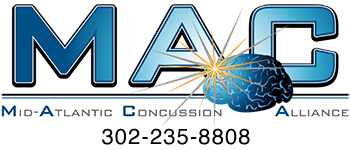Because post-concussion depression is something we do come across in our practice, MAC Alliance is happy to learn that the Federal Communications Commission (FCC) has approved a three-digit suicide prevention hotline: 988. According to recent news, the “988” number will be implemented in the near future for people in crisis. Individuals can dial 988 instead of 911 (as if it’s a fire or household emergency). Individuals can also currently dial the National Suicide Prevention Lifeline, 800-273-TALK (8255). This number is routed to crisis centers. According to one article in USA Today, that number received 2.2 million calls in 2018.
Concussions and Depression
More than two million people suffer head injuries each year as a result of falls, sports and combat injuries, car accidents and violence. Head injuries can cause hormonal imbalances that then cause mood problems and other issues as well as depression, anxiety or, the worst-case scenario, suicidal thoughts.
Unfortunately, many concussion patients don’t realize that new symptoms of depression can be related to a head injury they may have suffered months, or even years before. We ask our concussion patients every visit about symptoms of anxiety or depression. Sometimes they occur right away and sometimes they develop weeks or months after the head injury.
Anxiety and depression are caused by a chemical deficit of neurotransmitter production and availability in the brain. The lack or low level of specific neurotransmitters including norepinephrine and serotonin lead directly to a chemically induced anxiety and/or depression. Patients can benefit both from medications and psychotherapy to help deal with this drop in neurotransmitters and dealing with the symptoms of anxiety/depression.
The key to medications is to find the right medication and the right dose. Once the correct medication and dose are discovered, research is supportive that the medication must be continued for at least 6-12 months to fully replace the depleted neurotransmitter levels back to normal. It is important that the patient work directly with the medical provider to find the right medication and right dose even if it takes weeks or months to figure it out. Not treating anxiety or depression to full recovery leaves the concussion patient at a much higher risk for poor outcomes and long-term issues that may even result in suicide.
Suicide and Concussion
A Canadian research project highlighted in The Washington Post (February 2016) showed a suicide rate nearly three times the normal population in people with reported concussions. Another study reported in JAMA Neurology last year said that “the risk of suicide was 2-fold higher for people diagnosed with at least one concussion and/or mild TBI (traumatic brain injury) compared with those not diagnosed with a concussion and/or mild TBI”.
Please know that we’re certainly NOT saying that your head injury is going to lead to depression or worse. We just want to reiterate that depression, anxiety, irritability, fatigue and other negative issues are actually not uncommon symptoms reported in post-concussion patients.
For those rare patients who have suicidal thoughts, we’re glad that “988” will be available in the not-too-distant future. As a USA Today recent article reported, “it’s not a hotline, it’s a ‘warmline’ that “gives mental health help before a crisis heats up.”
09/02/2020 UPDATE: In July, the FCC unanimously voted to finalize 988 as the three-digit number Americans can dial to be directed to the 24/7 national hotline. According to CNN, phone service providers will have until July 16, 2022 to implement the 988 number nationwide. The FCC will need to market this hotline so people understand its purpose and how it works. If you or someone you know is having suicidal thoughts, please contact the National Suicide Prevention Lifeline at 1-800-273-8255. Trained counselors are available 24/7.








